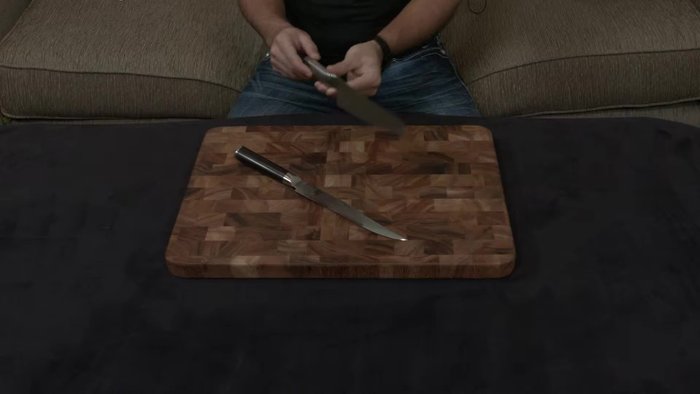Choosing the right carving knife can significantly impact your cooking experience. This detailed comparison delves into two popular contenders: the Shun Classic and the Global G3 21cm carving knives. Both are eight-inch knives renowned for their quality and performance, frequently cited among home cooks and professional chefs alike. They boast similar price points, making them accessible to a broad range of users. However, despite their superficial similarities, these knives differ significantly in their construction, blade material, and long-term value proposition. This comparison explores these key differences to help you determine which knife best suits your individual needs and culinary style.This in-depth analysis examines the construction methods—full tang versus two-piece—the distinct steel types employed (VG-MAX versus Cromova 18), and the aesthetic and practical implications of these choices. We will compare their edge retention, durability, resistance to damage, and the crucial aspect of long-term maintenance. Finally, we'll consider the impact of each knife's lifetime warranty, including the unique benefit offered by Shun's free lifetime sharpening service. By the end, you'll have a clear understanding of the strengths and weaknesses of each knife, empowering you to make an informed decision based on your priorities.
Pros And Cons
- Handmade in Japan
- 16-degree cutting angle
- Forged full tang
- Pakkawood handle (water-resistant)
- VG Max steel (harder, holds edge longer, more resilient)
- 34 layers of stainless steel incorporated into blade (Damascus design, rust/pitting/stain resistant)
- Lifetime warranty
- Lifetime free sharpening
- Handmade in Japan
- 15-degree cutting angle
- Lightweight due to hollow handle filled with sand
- Chromium-Molybdenum steel (more abuse-tolerant)
- Two-piece construction (potential for breaking along weld)
Read more: 10 Best Ceramic Sushi Knives: Ultimate Guide
Similarities: A Look at Shared Features
Both the Shun Classic and Global G3 21cm carving knives are roughly eight inches long, making them ideal for various carving tasks. They share a similar price point, appealing to a wide range of consumers. Both knives are also renowned brands, frequently appearing in comparisons amongst home cooks and professional chefs.

Manufactured in Japan, these knives boast a Japanese-style design and cutting angles. The Shun Classic features a 16-degree cutting angle, while the Global boasts a slightly sharper 15-degree angle. Adding to their appeal, both knives come with a lifetime warranty, ensuring long-term value for the buyer.

Despite their similarities, however, the manufacturing process significantly differentiates these two knives. It's important to note these key differences to help consumers choose the right knife for their needs and preferences.

Manufacturing Differences: Forged vs. Two-Piece Construction
The Shun Classic showcases traditional Japanese craftsmanship, featuring a full tang construction where the blade extends fully through the handle. Its handle is made of Pakkawood, a compressed resin, ensuring durability and water resistance.

In contrast, the Global G3, with its modern aesthetic, is a two-piece knife. The blade and hollow handle, filled with sand, are manufactured separately and then welded together. This design provides a lighter knife, but it also carries a potential risk.

While rare, some users have reported breakage along the weld point of the Global knife. This is a critical difference to consider when comparing the longevity and reliability of each option.

Steel Composition and Edge Retention
The blade materials also differ significantly. The Global G3 employs Cromova 18 steel, a softer steel with a hardness of 56-58 HRC. This allows for greater flexibility and abuse resistance.

Conversely, the Shun Classic utilizes VG-MAX steel, a harder steel (61 HRC) superior to VG-10. This translates to superior edge retention and resilience, requiring less frequent sharpening.

While the Global's softer steel can endure more abuse, the Shun Classic's harder steel ultimately maintains its sharpness longer, requiring less maintenance over time. The choice here depends on the user's priority: longevity of sharpness or ability to withstand heavier use.

Construction and Design: Damascus Steel vs. Single Steel
The Shun Classic's blade isn't just made of VG-MAX; it incorporates 34 layers of stainless steel, creating a beautiful Damascus pattern. This multi-layered construction adds to its durability and resistance to rust, pitting, and staining.

The Global G3, in contrast, is a single piece of Cromova 18 steel. While simpler in construction, it lacks the aesthetic appeal and enhanced durability offered by the Shun Classic's layered design.

The Damascus steel on the Shun Classic offers superior resistance to corrosion, adding another layer to its overall longevity and making it a compelling option for long-term use.
Warranty and Sharpening: A Key Differentiator
Both knives offer lifetime warranties, but the Shun Classic provides an additional benefit: free lifetime sharpening. This is a significant advantage, considering the cost of professional sharpening—approximately $5 per inch or around $40 for both knives.

Shun's free sharpening service guarantees the original edge, a feature lacking in the Global G3. While the Global's warranty covers defects, it doesn't include free sharpening, adding potential long-term maintenance costs.

This difference in service might be a determining factor for many, given the convenience and cost savings associated with Shun's free lifetime sharpening.

Conclusion: Which Knife Reigns Supreme?
Ultimately, the choice between the Shun Classic and Global G3 carving knives depends on individual preferences and priorities. The Global G3 offers a lighter, more flexible knife suitable for those who prioritize abuse resistance and a lower initial cost. The potential for weld failure is a notable consideration.
The Shun Classic, with its superior edge retention, enhanced durability, stunning Damascus pattern, and free lifetime sharpening, represents a premium option for those prioritizing long-term value and sharpness. While it carries a potentially higher initial cost, the long-term savings in sharpening and the exceptional edge retention make it a strong contender.
Both are excellent knives, but the Shun Classic emerges as the slightly superior choice for users who value a longer-lasting, sharper edge and appreciate the added value of free lifetime sharpening. This makes the higher initial cost ultimately worth it for many users.
